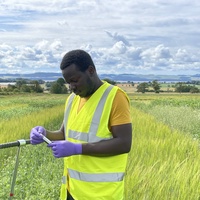
Research PG
- About
-
- Email Address
- o.durodola.21@abdn.ac.uk
- School/Department
- School of Geosciences
Biography
2021 - present: PhD in Geosciences
University of Aberdeen, Aberdeen, United Kingdom
The James Hutton Institute, Dundee, United Kingdom
-
- Thesis title: Optimising water use and soil carbon sequestration - can agricultural co-cropping systems provide multiple benefits to address climate change?
2018 - 2020: MSc Water Engineering (Distinction)
Abou Bekr Belkaid University of Tlemcen and Pan African University Institute of Water and Energy Sciences (PAUWES), Tlemcen, Algeria
-
- Thesis title: Simulating the impacts of climate change on water and crop productivity in Ogun-Osun River Basin, Nigeria
2010 - 2015: B.Tech Hons Agricultural Engineering (First Class)
Ladoke Akintola University of Technology, Ogbomoso, Nigeria
-
- Project title: Development and evaluation of an oil palm fruits digester
- Research
-
Research Overview
- Nature Based Solutions
- Soil Science
- Hydrology and Hydrological Modelling
- Stable Water Isotopes
- Sustainable Agriculture
- Water-Food-Climate Change Nexus
Current Research
Research title: Optimising water use and soil carbon sequestration - can agricultural co-cropping systems provide multiple benefits to address climate change?
Despite the potentials of agricultural co-cropping systems (known as intercrops in some contexts) in improving yields, enhanced water use, and other multiple benefits (e.g. biodiversity, soil health), it is still considered experimental and not yet widely practiced in Scotland. Therefore, there is a need to study the role of water availability on competitive water use between co-existing crops and how this interacts with soil carbon. The degree to which complementary resource use (e.g. water uptake from different soil depths) occurs is controlled by factors including climate, resource availability, plant traits and management practices. The success of co-cropping systems therefore depends on hydrological, eco-physiological and biogeochemical interlinkages via plant-soil-water interactions. Associated water and carbon cycles are tightly coupled, but they are mostly studied in isolation, so that feedbacks and thresholds are poorly understood. This research focuses on disentangling these interactions to gain a better understanding of the processes underlying optimal co-cropping systems for multiple benefits, including water use and carbon sequestration. Ultimately, the research will explore co-cropping systems as a solution for sustainable water use and soil carbon sequestration, thereby ensuring food security in Scotland and globally in the face of climate change.
The research is funded through the Scottish Hydro Nation Scholarship Programme and involves collaboration with the James Hutton Institute.
- Publications
-
Page 1 of 1 Results 1 to 9 of 9
Effects of barley-pea intercropping on soil carbon, crop productivity and grain quality in a low-input temperate agroecosystem
Agronomy JournalContributions to Journals: Articles- [ONLINE] DOI: https://doi.org/10.1002/agj2.70275
Soil water and carbon dynamics of barley - pea intercropping in a temperate environment under projected climate change
Science of the Total Environment, vol. 1010, 181060Contributions to Journals: ArticlesStable water isotopes reveal modification of cereal water uptake strategies in agricultural co-cropping systems
Agriculture Ecosystems & Environment, vol. 381, 109439Contributions to Journals: ArticlesUsing stable isotopes to inform water resource management in forested and agricultural ecosystems
Journal of Environmental Management, vol. 365, 121381Contributions to Journals: Review articlesIntegration of gender considerations into Tanzania's climate and water policies
Water Policy, vol. 24, no. 1, pp. 101–116Contributions to Journals: ArticlesModelling the Impacts of Climate Change on Soybeans Water Use and Yields in Ogun-Ona River Basin, Nigeria
Agriculture, vol. 10, no. 12, 593Contributions to Journals: Articles- [ONLINE] DOI: https://doi.org/10.3390/agriculture10120593
- [ONLINE] https://www.mdpi.com/2077-0472/10/12/593
Modelling Maize Yield and Water Requirements under Different Climate Change Scenarios
Climate, vol. 8, no. 11, 127Contributions to Journals: Articles- [ONLINE] DOI: https://doi.org/10.3390/cli8110127
- [ONLINE] https://www.mdpi.com/2225-1154/8/11/127
COVID‐19 and the water–energy–food nexus in Africa: Evidence from Nigeria, Uganda, and Tanzania
World Water Policy, vol. 6, no. 2, pp. 176-201Contributions to Journals: Articles- [ONLINE] DOI: https://doi.org/10.1002/wwp2.12039
Using every drop: Rainwater harvesting for food security in Mbale, Uganda
Water Practice and Technology, vol. 15, no. 2, pp. 295–310Contributions to Journals: Articles- [ONLINE] DOI: https://doi.org/10.2166/wpt.2020.019
- [ONLINE] View publication in Scopus
